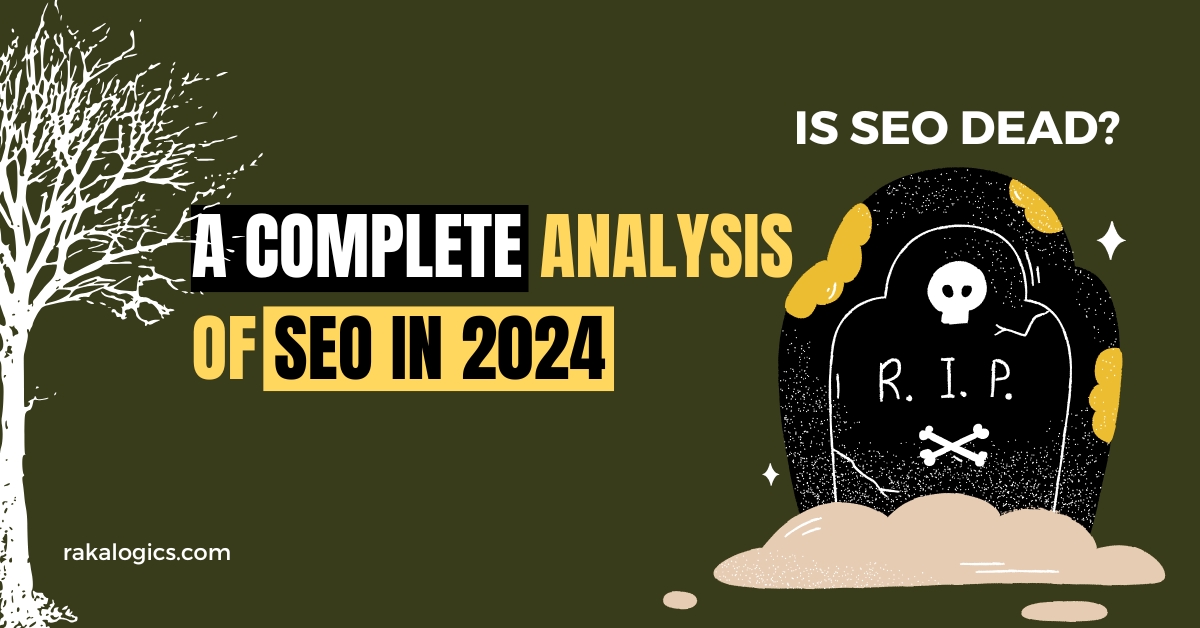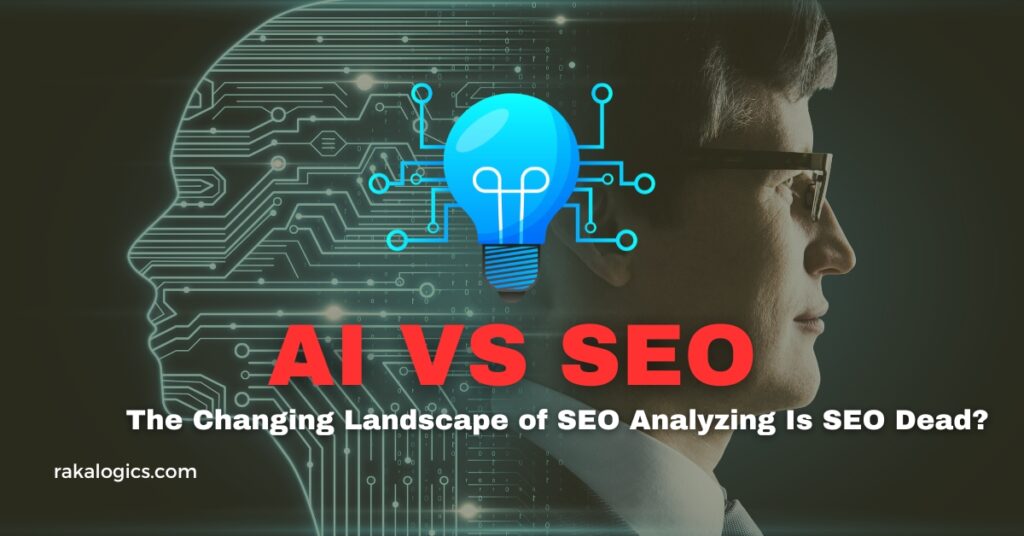
Is SEO Dead? This is one of the questions that has been floating in digital marketing circles for years. Especially with the emergence of new technologies and platforms. With everything from artificial intelligence to voice search and the importance of social media, many have wondered if traditional SEO is dead. But SEO is very much not dead. It has grown rather, responding to the changing needs of users and search engines. Therefore, SEO nowadays is not only on keyword optimization but also on understanding the intent of the user. And also the value of content produced for them, and makes an overall better experience for the visitor. In short, though the tactics have changed, their fundamental role in digital marketing hasn’t.
As the world has watched the fast evolution in search engines, people have been debating over the years the question Is SEO dead?
Nowadays, with people using AI and voice searching, social media dominance has taken a big place in the internet world. Some people believe it is because of the prevalence of AI, voice searching, and social media that SEO isn’t as vital anymore. Others just believe it has evolved and is no more.
Evolution of SEO-Brief Overview About Is SEO Dead?
Initially, during the 1990s, SEO was becoming more important because Yahoo! and AltaVista were the dominant players during the early Internet days. By the time Google came about in 1998, this aspect was integrated into digital marketing. From keyword stuffing to link farms to the user, SEO developed from there. Google’s algorithms, ranging from Penguin, and Panda, to Hummingbird updates, literally gave SEO strategies a hard twist so that attention was paid to quality content, intent, and user experience rather than gaming the system.

Between 2010 and 2019, mobile search, voice search, RankBrain, and other AI-based technologies became the key refinements of SEO. Finally, as of 2020, the whole playing field is dominated by the BERT update from Google, focusing more on giving more understanding to nuances in search queries.
Jump forward to 2024, and SEO is still a thing, but it’s not the same SEO people had known. Is it dead, then? Let’s break down some of the biggest arguments and trends shaping SEO in today’s world.
The Changing Landscape of SEO|Analyzing Is SEO Dead?
The Impact of Artificial Intelligence (AI)
AI has changed the game of search engines. These great tools, such as Google’s RankBrain and BERT, focus more on converting the conventional keyword-based search to just understanding the intent behind a search query and NLP. This implies that AI will enable Google to understand the intent behind a query apart from being vague and poorly structured. Therefore, for all content creators and marketers, meaning is what matters most, and not a piece of text that includes an exact match keyword.
When AI comes into its own in 2024, tools like ChatGPT and other AI-based technologies make it possible to find answers without scanning through multiple sources on a search results page. Some even believed that this was a death sentence for SEO, but AI cuts around the traditional means of SEO and makes them somewhat unnecessary. However, AI search still relies on quality content in answering questions given to it. Therefore, SEO is less dead than reborn.
Also Read:10 Best AI Tools in 2024 Everyone Should Know
Voice Search Booms
According to research by Google and other insights, voice search usage is exploding because of the increased adoption of virtual assistants such as Siri, Alexa, and Google Assistant. Voice search questions are often far longer and more conversational than text-based queries. This shift has consequently meant an increased importance of long-tail keywords and natural language throughout the content being produced.

For example, what would a natural, typed query be? Best pizza in New York. But for voice search, the query might be, “What’s the best pizza place near me in New York?” So for voice search optimization, you understand how people speak and not how they type; hence, your content will be structured in a way that answers the conversational queries.
Some say voice search reduces the burden of SEO. Not even close. Voice search optimization is more the continued search optimization environment for featured snippets, local SEO, and “how to fit accurate answers in simple enough words for a user to find what he’s looking for.”
Mobile-First Indexing and User Experience
Google has also adopted the mobile-first indexing strategy, where its primary indexing and ranking basis would be the mobile version of a website. In addition to this, the shift in predominance regarding mobile internet usage underscores how essential the design of a mobile-friendly website remains now more than ever.
In 2024, user experience is the most dominant ranking factor. Page load speed, mobile-friendliness, and responsiveness ensure that your website does not lack good rank in search results. Today, SEO owes much to web design, calling for the joint efforts of developers and marketers to ensure that seamless user experiences are achieved on any device.
Quality and Relevance Above Quantity of Content|In Raising Question Is SEO Dead?
Those times are long gone; that is, you could rank high just by churning out mass-produced content that was stuffed with keywords. Today, it matters content and relevance. Google’s algorithm has grown so advanced that it could assess the depth, originality, and usefulness of the content.
Considering the priority given to experience from the user’s perspective, search engines focus on answering the user query efficiently and creating value-rich content. The long-form type of content in guides, case studies, and data-backed reports- generally tends to rank better because it provides more comprehensive answers.
Keyword optimization is still valid in 2024 but would only be relevant if used toward the quality of the content and relevance to the searched topic. A connection between the user intent and the content should be made to ensure success with the help of SEO. The Googleians would favor such content that is not just engaging but contains expert opinions or accurate data.
Engagement with Social Media and Paid Ads
Organic search, however, has been more of an importance to a digital marketing strategy but no longer comes close. Paid ads and social media now fill this role. When popular discovery platforms include Facebook, Instagram, and TikTok, business can easily reach their audiences without SEO.
Many marketers in 2024 concentrate on integrating SEO with broader content marketing strategies – while social media, influencer partnerships, and paid advertisements assume a greater role. It doesn’t imply that SEO is dead; rather, it has merely become something other than the single driving force and channel for conversions. Instead, SEO now fights for relevance with a mix of various digital marketing efforts.
Read more: Social Media Optimization in 2024
Myth-Busting| SEO Is NOT Dead
Search Intent and User Behavior Still Matter
Well, even if AI, Voice search, and even social media boom and expand, people still use Google to find what they are looking for, be that information, services, or products. Hence, SEO helps businesses understand and create content based on user intent and what he or she is searching for with specific keywords.
The Evolution of E-commerce and Local SEO
E-commerce is on the rise, especially post-pandemic, and focuses more on local SEO. Consumers are now looking for businesses and services nearby more than ever. And listings in Google My Business help businesses surface in local search results. It’s always important to stay top of mind for local customers by optimizing for local SEO.
The Importance of Evergreen Content
Evergreen content is content that remains relevant over time to be the foundation of a good SEO strategy. For example, blog posts, how-to guides, reviews of products, and generally informational content continue to attract regular traffic from search engines provided that they are optimized and updated periodically.
SEO is not just about driving traffic; it is about driving the right kind of traffic. Some of the most effective ways to ensure long-term visibility are derived from high-quality evergreen content, backed by robust SEO practices.
The Future of SEO|What’s Next?
Here are a few things to watch out for:
- AI-based Personalization: With a rising tide in advanced AI technologies, “completely personal” search results will be much more ordinary. SEO strategies should then start targeting to provide highly personalized content attractive to the avowed preferences of users.
- Visual and Video Search-With the rising visual search engines such as Google Lens and the growing importance of videos on YouTube. SEO strategies will need to optimize pictures and videos to create keyword optimization in search engines.
Google has achieved this with featured snippets and knowledge panels, which provide answers on the SERP without requiring a click into other sites. Then, SEO will focus on zero-click searches, wherein information is pulled in without clicking through.
- How AI Chatbots Will Change Everything: With the advent of AI chatbots like ChatGPT, companies might have to rethink how to optimize content for interaction-based searches.
Conclusion-Is SEO Dead?
The short answer is no. SEO is far from dead, but it is constantly changing. Tactics that served successfully five years ago are no longer working. But the core principles of building valuable, relevant content that answers a user’s inquiry remain vital. As long as users rely on search engines to seek out information, then SEO will be an integral part of any effective digital marketing strategy.
The key to success in the year 2024 is that SEO is not dead-it is maturing. Marketers and content creators need to embrace AI, voice, and mobile search while keeping the viewpoint of user experience. As this will keep their SEO future-proof for those times ahead.
FAQs About IS SEO Dead?
Is SEO dead in 2024?
No, SEO is not dead. It has evolved quite differently with developments in AI, voice search, and mobile-first indexing. While the old ways of SEO have become outdated, its age-old principles continue to dominate businesses in terms of online survival.
What kind of impact has AI had on SEO and why do people think that SEO is Dead?
It has, in all, changed the way a search engine comprehends and ranks content with AI. Especially through algorithms like RankBrain and BERT at Google. SEO, once about the obsession with keywords, now focuses on search intent, context, and the use of natural language processing, so the content has to answer queries in smarter ways.
Does Voice Search have any impact on SEO strategies?
Yes, voice search has changed the entire strategy of SEO. Because voice searches are more conversational and longer than text-based queries. SEO adjusts by using long-tail keywords and producing content that clearly and concisely answers conversational questions.
What role plays mobile-first indexing in SEO today?
Mobile-first indexing is the act of where Google indexes mainly the mobile version of a website. In 2024, the majority of websites that aren’t mobile-friendly will most likely take a hit in their ranking. So putting mobile optimization as a key component of modern-day SEO.
How essential has UX become for SEO?
User experience, in 2024, becomes very important for SEO. It does not matter whether this includes page load speed, or mobile responsiveness, all these factors directly affect the ranking of search results. Google will always do the right thing and will prioritize pages that offer the best user experience.
How relevant is content quality to SEO in 2024?
Perhaps more than ever, content quality matters. Search engines rank higher for content that is original, informative, and directly relevant to the intent of the user. Using keywords won’t be enough to rank since content must have real value behind it to rank well.
Has social media reduced the need for SEO?
Social media and paid ads are components of a digital strategy. All these improve brand visibility and engage the user when sent through social media.
while SEO continues to drive organic traffic.
What is local SEO, and why is it important?
Local SEO is an optimization of a business for location-based searches. That is, the website will appear in local results and on Google Maps. These are the reasons why local SEO is important for business owners. They want to attract customers based close to their location and follow the tendencies of local search in 2024.
What are zero-click searches, and what do they mean in terms of SEO?
Zero-click search is the query on which the answer appears on the result page. A user will not have to click on any site to get an answer. Although this trend lowers the click-through rate, optimizing for featured snippets and





